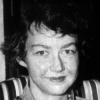Flannery O'Connor

Flannery O'Connor
Mary Flannery O'Connorwas an American writer and essayist. An important voice in American literature, she wrote two novels and 32 short stories, as well as a number of reviews and commentaries. She was a Southern writer who often wrote in a Southern Gothic style and relied heavily on regional settings and grotesque characters. Her writing also reflected her own Roman Catholic faith and frequently examined questions of morality and ethics. Her posthumously-compiled Complete Stories won the 1972 U.S. National Book...
NationalityAmerican
ProfessionNovelist
Date of Birth25 March 1925
CitySavannah, GA
CountryUnited States of America
I believe the teacher's work is largely negative, that it is largely a matter of saying, "This doesn't work because ..." or "This does work because ..." The because is very important. The teacher can help you understand the nature of your medium, and he can guide you in your reading.
The reviewer always has hold of the wrong horror.
The beginning of human knowledge is through the senses, and the fiction writer begins where the human perception begins. He appeals through the senses, and you cannot appeal through the senses with abstractions.
Every morning between 9 and 12 I go to my room and sit before a piece of paper. Many times, I just sit for three hours with no ideas coming to me. But I know one thing. If an idea does come between 9 and 12 I am there ready for it.
The basic experience of everyone is the experience of human limitation.
There's many a bestseller that could have been prevented by a good teacher.
The grandmother didn't want to go to Florida. She wanted to visit some of her connections in east Tennessee and she was seizing at every chance to change Bailey's mind. Bailey was the son she liver with, her only boy.
The fiction writer has to engage in a continual examination of conscience. He has to be aware of the freak in himself.
I am a Catholic not like someone else would be a Baptist or a Methodist, but like someone else would be an atheist.
I know well enough that very few people who are supposedly interested in writing are interested in writing well. They are interested in publishing something, and if possible in making a "killing." They are interested in being a writer not in writing. . . If this is what you are interested in, I am not going to be much use to you.
It is a good deal easier for most people to state an abstract idea than to describe and thus re-create some object they actually see.
Technique in the minds of many is something rigid, something like a formula that you impose on the material; but in the best stories it is something organic, something that grows out of the material, and this being the case, it is different for every story of any account that has ever been written.
When using dialect, use it lightly. A dialect word here and there is enough. All you want to do is suggest. Never let it call attention to itself.
As for the blood and the head business, the blood and the head work together and what is not first in the blood can sometimes reach it by going first through the head and what is wrong in the blood can sometimes be tempered by the head.